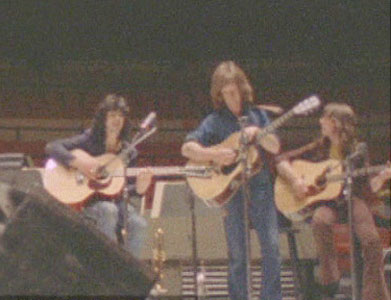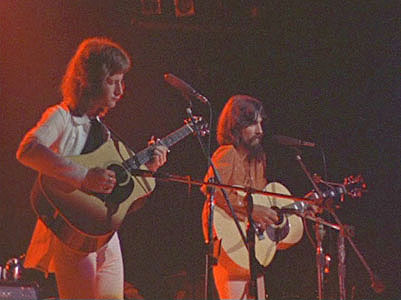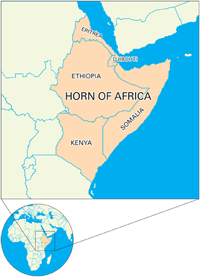Badfinger &
Bangladesh
by Tom Brennan
It was May, 1971. Badfinger had just had their first
attempt at recording their new album which was rejected by George Harrison
in April for allegedly sounding too Beatles-like. George Harrison had been
brought in to replace Geoff Emerick as producer. In the first set of
sessions that were booked at Abbey Road Studios, Badfinger & Harrison
got as far as remaking two songs ("Suitcase" and "Name Of The Game") and
recording two new songs ("Day After Day" and "I'd Die, Babe"). The
sessions took place between May 30 and June 10, 1971. Harrison never
completed final mixes.
While waiting for George to schedule the next set of sessions, Badfinger
worked on new material at Clearwell Castle, a place they had just recently
rented for more space to rehearse and record their demos. Finally, after
George Harrison finished recording the song "Bangla Desh," they received a
call on July 16th scheduling a meeting. Harrison told Badfinger, "I've got
to help Ravi. I can't produce you any further." The band waited, and a few
days later, they got a phone call from George telling them he would like
them to play at the charity concert he was putting together.

Tom Evans, Pete Ham, Joey Molland during
rehearsals
Badfinger had played acoustic guitars & percussion on the All
Things Must Pass album and Tom & Pete had sung backing
vocals on Ringo's single, "It Don't Come Easy," Badfinger were among the
first artists that George invited to help him with the Concerts For
Bangladesh, since they already knew much of the material that would be
performed. Also invited was Leon Russell, who had been helping George out
on the eventual Straight Up sessions, overdubbing a
guitar "horn" part to the remake of "Suitcase" on June 7, and also
overdubbing a piano part to "Day After Day" on June 8.
During the concerts on August 1st at Madison Square Garden in New York
City, Mike Gibbins played tambourine, while the other three played
acoustic guitars. In addition, George brought Pete Ham into the spotlight
to assist him on acoustic guitar to play "Here Comes The Sun." Pete said
in an interview, "George just said he wanted to keep it simple. He told me
to use a capo on it and what changes were important. Then I went back to
the hotel and listened to the Abbey Road tape. We never rehearsed it - no
time!"
This showed how much George respected Pete as a guitarist, probably a
result of all the hours working in the studio recording with Pete on the Straight
Up album project and All Things Must Pass
sessions had given George confidence he could pull this off. In fact, at
early rehearsals in late July, Mike Gibbins recalled that Pete was singing
"My Sweet Lord" with George.

Pete Ham, George Harrison at
the evening concert
After Badfinger's return to London in August, Pete Ham was teased by Joey
& Kathie Molland for being "the lucky one" chosen by George to help
him play "Here Comes The Sun." As a result of this, Pete's one-time
girlfriend, Beverley Ellis said that Pete let out his frustrations through
writing the song "Take It All." Badfinger recorded the song when sessions
resumed for their Straight Up album in late September
with Todd Rundgren taking over as producer, as George Harrison was busy
elsewhere mixing & producing the live concert album & film with
Phil Spector.
The first line of Ham's "Take It All" is the obvious
reference to his acoustic guitar duet with Harrison ("In a way, the sun
has shone on me..."). This can be interpreted in two ways. "The sun"
meaning the song "Here Comes The Sun," or as a reference to Pete being in
the spotlight with George having the light shining on him as opposed to
when he was in the relative darkness onstage with Tom & Joey for the
rest of the time during the concerts playing backing acoustic guitars
which the audience could barely hear. Another significant line ("Any day,
the sun will shine on you. Makes it silly to take it bad...") is a
reference to Joey's jealousy for not being chosen by George to play with
him.

All-in-all the Bangladesh Concerts were acknowledged by the band members
as a great experience, though nerve-wracking. For Tom Evans, he was
obviously starstruck by meeting Bob Dylan: "...before the gig, me and Pete
were just having a blow on acoustic guitars in the dressing room, heads
down, you know, going away there and another guitar joins in and it's
Dylan playing along and it's like -- uuh, and I just froze, and he says,
"No, carry on. It's good, you know."
As Pete Ham once said, when asked about the duet spot in a
taped interview: "Can you record shaking?" But Harrison had all the
confidence in the world in Pete, as Mike Gibbins once stated: "George
thought he was superb. I mean George wouldn't have said, 'Come and do
"Here Comes The Sun" with me,' if he didn't think he was good; I mean he
was GOOD."
sources: "Without You: The Tragic Story of Badfinger"
book, Dan Matovina, Concert For Bangladesh DVDs (2005), Glenn A. Baker.
August, the MONTH OF
GIVING...
Now on iTunes, you can purchase a download of the Concert for Bangladesh
album (including the studio version of the song Bangla Desh).
Please donate to help children affected by the famine in Africa. Just like
George asked his friends Badfinger to help with the benefit concert, I’m
asking Badfinger fans to help. Honor the memories of Pete Ham, Tom Evans
& Mike Gibbins + help kids in Africa by texting FRIEND to
864233 to donate $10! Check out Concert for Bangladesh info now
at http://bit.ly/4afriend

The Month of Giving Campaign has been raising much needed funds to support
UNICEF’s emergency relief efforts in drought-affected Kenya, Somalia,
Ethiopia and Djibouti (known as the Horn of Africa). UNICEF is one of the
very few international organizations delivering aid in Somalia, the
epicenter of the crisis, and is the single largest provider of life-saving
therapeutic food for children in the country. Because of your support,
UNICEF has been able to provide children the basics they need to survive,
including clean water, food, medicine, and vaccinations to prevent killer
diseases like measles and polio that prey on malnourished children.
Unfortunately, the situation is worsening and famine has now spread to
five areas of southern Somalia. Tens of thousands of children are dying,
and we must continue to bring immediate attention to this crisis. UNICEF
has called this situation in the Horn of Africa “the most severe
humanitarian emergency in the world.”
http://www.youtube.com/watch?v=T63sIphcC3E
© Copyright 2011-2018
Tom
Brennan's Badfinger Library. All Rights Reserved.
Reproduction in whole or in part in any form or medium without permission
is prohibited.
All trademarks used are the property of their respective owners.



